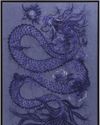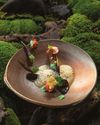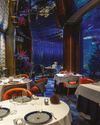
Textiles don’t just serve a functional purpose – they often are heritage crafts that capture the unique art and history of different cultures. Batik, is one such example that is identifiable immediately, whether for people in Southeast Asia, where it is commonly seen and worn, or even those in other parts of the globe. Just think of the Singapore Girl and her iconic batik sarong kebaya uniform. The floral-motif fabric it is made out of has become synonymous with Singapore Airlines, and perhaps the most recognisable form of modern batik across the world.
Its contemporary commercial applications aside, batik actually has a history that goes far back in time. According to Unesco, it is thought to be over 1,000 years old, with historical evidence indicating its use in parts of Africa, Asia and the Middle East. The truth, however, is that no one can pinpoint exactly where and when it originated from. But the form of batik that we are familiar with today is an Indonesian, or more accurately, Javanese creation that is at least 300 years old.
Indonesian batik was added to Unesco’s Intangible Cultural Heritage of Humanity list in 2009, and is officially recognised as a historical fabric. The traditional way of making it is highly labour-intensive and utilises a wax-resist fabric dyeing technique: Before the fabric is dyed, patterns are “drawn” onto it by hand with molten wax, using a tool known as a canting, or manually stamped on with handcrafted pattern blocks.
The dye doesn’t absorb into the areas that have wax on them, which explains how designs and motifs are then transposed to the fabric. The same process can be repeated multiple times depending on how complicated or intricate the final design is.
This story is from the {{IssueName}} edition of {{MagazineName}}.
Start your 7-day Magzter GOLD free trial to access thousands of curated premium stories, and 9,000+ magazines and newspapers.
Already a subscriber ? Sign In
This story is from the {{IssueName}} edition of {{MagazineName}}.
Start your 7-day Magzter GOLD free trial to access thousands of curated premium stories, and 9,000+ magazines and newspapers.
Already a subscriber? Sign In

FEELING NEAT
The Balvenie 30 combines traditional techniques with rich, layered flavours, offering a refined quaff for collectors and connoisseurs alike.

CROWNED AS KING
King Living brings home the gold with a double victory at the 2024 Australian Good Design Awards.

ART DECO DREAMS
Khoon Hooi and PRESTIGE hosted an exclusive afternoon tea unveiling the eponymous designer's Art Deco-inspired collection, where guests embraced couture in anticipation of the PRESTIGE KL Ball.

MYTH OF THE MAN
In dedication to his late mother, Myth: Evolution’ takes us through the personal and professional journey of Dato’ Sri Bernard Chandran through the vision of the dragon.

GREEN IS THE WARMEST COLOUR
From green initiatives to mythical beast-imbued writing instruments, our eclectic list of toys is sure to usher in the end-of-year cheer.

FOOD AWAKENING
From shopping sprees to setting off for Sabah and savouring some weekend hotel dining, it looks like food lovers are in for a busy month ahead.

AUTUMN JAUNTS
From deep waters off the coast of Singapore to the racetracks of Dubai, our travel recommendations for November ensures diversity in choice, and excitement in the experience.

REDEFININING URBAN LIVING
Sustainability, safety, and style come together in the innovative Swedish marque's latest all-electric compact SUV, designed for the modern city dweller.

PORT OF CALL
During the last week of September every year, the action in the Mediterranean’s glamorous enclave of Monte Carlo shifts to the famous Port Hercules for the annual Monaco Yacht Show, allowing visitors a glimpse of some of the finest yacht launches.

THE FIRST WAVES
From backstage interviews to KL cuisine under the Johor sun, the Ombak Festival's debut made its mark.